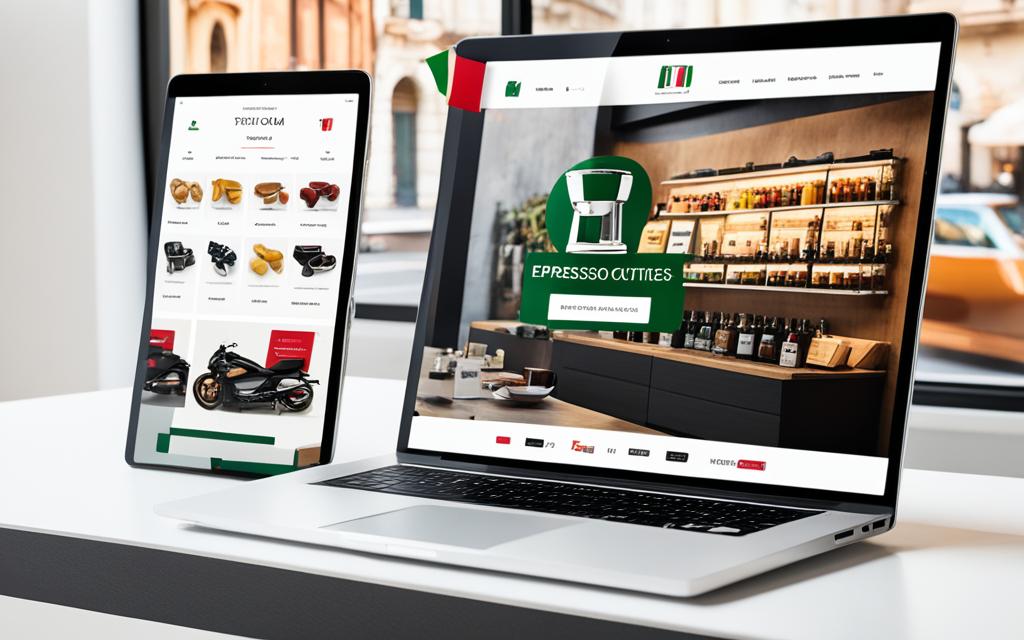Welcome to our guide on launching your E-Commerce business in Italy! If you’re considering expanding into the Italian market, you’ve made a wise choice. Italy has a thriving E-Commerce industry with tremendous potential for growth and success. Whether you’re a small business owner or an established brand, tapping into the Italian market can open up exciting opportunities for your online business.
In this section, we will provide you with expert insights and practical tips to help you navigate the essential steps and considerations for starting an E-Commerce business in Italy. From understanding the market dynamics to complying with legal and regulatory requirements, we’ve got you covered.
Launching your online business in Italy can be both exciting and challenging. But don’t worry, we’ll walk you through each step of the process, equipping you with the knowledge and strategies needed to make your venture a success. Are you ready to dive into the world of E-Commerce in Italy? Let’s get started!
Exploring the Italian E-Commerce Market
Italy’s E-Commerce market presents significant opportunities for online businesses looking to establish a foothold in the country. With a population of over 60 million and a high internet penetration rate, Italy offers a lucrative market for entrepreneurs seeking to tap into the country’s digital economy.
When it comes to E-Commerce, Italian consumers are increasingly embracing online shopping. With busy lifestyles and a desire for convenience, more people in Italy are turning to the internet to fulfill their shopping needs. This shift in consumer behavior has resulted in a growing demand for a wide range of products and services online.
Popular product categories in the Italian E-Commerce market include fashion and apparel, electronics, home and garden, beauty and personal care, and food and grocery. These sectors offer ample opportunities for businesses to cater to the diverse needs and preferences of Italian consumers.
However, it’s important to understand the competitive landscape within the Italian E-Commerce market. Local players, such as Amazon Italy and several established Italian retailers, dominate the industry. Competition is fierce, but with the right strategies and unique offerings, businesses can carve out their own space and attract a loyal customer base.
Staying updated with market trends, consumer preferences, and technological advancements is crucial to staying ahead in the competitive Italian E-Commerce market. By continuously monitoring and analyzing these factors, businesses can adjust their strategies and positioning to meet the evolving needs of Italian consumers.
Legal and Regulatory Requirements
When starting an E-Commerce business in Italy, it is crucial to navigate the legal and regulatory landscape to ensure compliance and avoid unnecessary complications. Understanding the legal requirements will help you establish a solid foundation for your online venture.
Company Registration
Before commencing operations, you must register your E-Commerce business with the relevant authorities. This process involves choosing an appropriate legal structure, such as a sole proprietorship or a limited liability company, and completing the necessary paperwork. Consulting with a legal professional can help you navigate this step smoothly.
Tax Obligations
Operating an E-Commerce business in Italy entails fulfilling various tax obligations. You will need to register for a tax identification number and familiarize yourself with the country’s tax system. Additionally, it is essential to understand VAT (Value Added Tax) regulations and ensure proper invoicing and record-keeping for tax purposes.
Data Protection
As an E-Commerce business, you will handle sensitive customer data, making compliance with data protection laws crucial. You must adhere to the General Data Protection Regulation (GDPR) and implement appropriate measures to protect customer information, such as secure data storage and customer consent for data processing.
Consumer Rights
When operating in the Italian market, it is vital to be aware of consumer rights and obligations. Customers in Italy are protected by consumer laws, which outline their rights regarding refunds, returns, warranties, and privacy. Ensuring transparent and fair practices will contribute to building trust with your customers and maintaining a positive reputation.
By understanding and complying with legal and regulatory requirements in Italy, you can establish a legally compliant E-Commerce business. This compliance not only mitigates the risk of fines and penalties but also fosters trust with your customers and sets the stage for long-term success.
Building Your E-Commerce Website
When it comes to building your E-Commerce website, there are several key considerations that can make a significant impact on the success of your online store. From choosing the right platform to designing an intuitive user interface, every aspect of your website plays a crucial role in driving sales and creating an engaging online presence.
Firstly, selecting the right E-Commerce platform is essential for the smooth functioning of your online store. There are various options available, each with its own features and capabilities. Take the time to research and evaluate different platforms based on your specific requirements, such as inventory management, payment gateways, and customization options.
Once you have chosen a platform, it’s time to design your website. A user-friendly interface is key to attracting and retaining customers. Ensure that your website is visually appealing, easy to navigate, and optimized for seamless browsing on both desktop and mobile devices. Consider incorporating high-quality product images and clear, concise product descriptions to enhance the overall user experience.
Remember to prioritize website security to build trust with your customers. Implement secure payment gateways and SSL certificates to protect sensitive customer information and provide a safe shopping experience. Display trust badges prominently on your website to reassure customers that their personal data is secure.
Optimizing your website for search engines is crucial for driving organic traffic and increasing visibility. Conduct keyword research and incorporate relevant keywords throughout your website’s content, including product descriptions, meta tags, and URLs. Additionally, optimize your website’s loading speed to enhance user experience and improve search engine rankings.
Finally, testing and analyzing your website’s performance is an ongoing process. Regularly monitor website analytics to gain insights into user behavior, identify areas for improvement, and track the success of marketing campaigns. Make data-driven decisions to optimize your website and maximize conversions.
By considering these key factors in building your E-Commerce website, you can create a robust and user-friendly online store that attracts customers, drives sales, and establishes your brand presence in the competitive world of E-Commerce.
Marketing and Promoting Your Online Business
Now that you’ve launched your E-Commerce business in Italy, it’s time to focus on marketing and promotion. Implementing effective marketing strategies is crucial for increasing brand visibility, attracting customers, and driving conversions. In this section, we’ll explore various techniques to help you market your online business and promote your E-Commerce in Italy.
1. Search Engine Optimization (SEO)
Optimizing your website for search engines is a key component of any successful marketing strategy. By targeting relevant keywords related to your products or services, you can improve your website’s visibility in search engine results. Include these keywords in your website content, meta tags, headings, and URL structures. Additionally, focus on building quality backlinks from reputable websites to improve your search engine rankings.
2. Social Media Marketing
Social media platforms are powerful tools for promoting your E-Commerce business and engaging with your target audience. Create compelling content that resonates with your audience and encourages them to share it with their networks. Use platforms like Facebook, Instagram, and Twitter to showcase your products, run contests, and interact with customers. Consider influencer partnerships to reach a wider audience and enhance brand credibility.
3. Email Marketing
Building an email list allows you to communicate directly with your customers and nurture leads. Offer incentives, such as exclusive discounts or informative content, to encourage visitors to subscribe to your newsletter. Use email marketing platforms to automate personalized email campaigns, sending targeted messages based on customer preferences, browsing history, and purchase behavior. Regularly analyze email performance to optimize your campaigns and drive higher conversion rates.
4. Content Marketing
Creating valuable and engaging content is essential for attracting and retaining customers. Develop a blog on your website where you can share informative articles, industry insights, and product demonstrations. Optimize your content for keywords relevant to your target audience, and promote it through social media channels and email campaigns. Quality content establishes your brand as an authority in your niche and enhances customer trust.
5. Pay-Per-Click (PPC) Advertising
PPC advertising allows you to display targeted ads to potential customers in search engine results or on social media platforms. Set a budget, select relevant keywords, and create compelling ad copy to attract clicks. Monitor your campaigns closely, analyzing metrics such as click-through rates (CTR), conversion rates, and return on ad spend (ROAS). Continuously optimize your PPC campaigns to maximize your advertising ROI.
6. Influencer Marketing
Collaborating with influencers who align with your brand values and target audience can significantly boost your online visibility and credibility. Identify influencers in your industry who have a strong following and engage with their audience. Reach out to them and propose partnerships, such as sponsored posts or product reviews. When done right, influencer marketing can generate buzz around your brand and drive traffic to your E-Commerce website.
By implementing these marketing strategies, you can effectively market your online business and promote your E-Commerce in Italy. Each technique offers unique benefits and can help you reach a wider audience, increase brand awareness, and ultimately drive sales. Tailor your marketing efforts to your target audience and regularly analyze your results to optimize your campaigns for maximum impact.
Italian Employment and Workforce Considerations
When operating an E-Commerce business in Italy, it’s crucial to understand the specific employment and workforce considerations. Familiarizing yourself with Italian labor laws, hiring practices, and employee benefits is essential for managing your workforce effectively and ensuring compliance with Italian employment regulations.
Italian employment laws encompass various areas such as contracts, working hours, and leave entitlements. It’s important to engage with legal professionals who can provide guidance on the appropriate employment contracts to be used and ensure compliance with regulations. These professionals can also guide you on Italian working time regulations, which may differ from other countries.
Hiring practices in Italy can be influenced by cultural norms and government regulations. Additionally, understanding the local recruitment landscape, including the popular job boards and platforms, can help you attract qualified candidates. By leveraging these resources, you can build a skilled workforce capable of driving your E-Commerce business forward.
Employee benefits are an integral part of Italian employment practices. Providing comprehensive benefits such as health insurance, pension schemes, and vacation allowances can help you attract and retain top talent. It’s important to consider these factors when designing your workforce compensation packages to ensure your employees feel valued and motivated.













